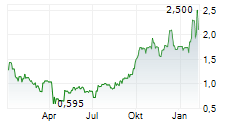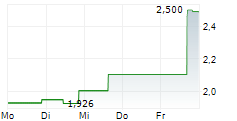
FARMINGTON HILLS, Mich., Sept. 30, 2024 (GLOBE NEWSWIRE) -- Ocuphire Pharma, Inc. (Nasdaq: OCUP), a clinical-stage ophthalmic biopharmaceutical company focused on developing and commercializing small molecule therapies for the treatment of patients with retinal and refractive eye disorders, today announced the publication of full results from two pivotal Phase 3 clinical trials (MIRA-2 and MIRA-3) that evaluated the safety and efficacy of RYZUMVI (Phentolamine Ophthalmic Solution 0.75%) for the treatment of pharmacologically-induced mydriasis in the peer-reviewed journal Ophthalmology. The results demonstrated that Phentolamine Ophthalmic Solution 0.75%, a non-selective alpha-1 and alpha-2 adrenergic antagonist, rapidly and effectively reversed pharmacologically-induced pupil dilation with a favorable safety profile.
As previously reported by Ocuphire, in both trials a statistically significant greater percentage of subjects treated with Phentolamine Ophthalmic Solution 0.75% achieved reversal of pharmacologically-induced mydriasis at 90 minutes compared to those receiving placebo, which was the primary endpoint. In the MIRA-2 trial, 48.9% of subjects treated with Phentolamine Ophthalmic Solution 0.75% achieved reversal versus 6.6% in the placebo group (p<0.0001). In the MIRA-3 trial, 58% of subjects treated with Phentolamine Ophthalmic Solution 0.75% achieved the primary endpoint versus 6% in the placebo group (p<0.0001). Effects were observed as early as 60 minutes following administration, with significant improvements in pupil diameter at that timepoint and at every timepoint measured up to 24 hours following administration in both trials. More subjects receiving Phentolamine Ophthalmic Solution 0.75% reported a perceived benefit in the resolution of visual symptoms caused by pharmacologically-induced mydriasis compared to placebo, with statistically significant differences noted as early as one hour following administration.
Fewer subjects treated with Phentolamine Ophthalmic Solution 0.75% (8-11%) had residual dilation at 24 hours post-dilation, compared to placebo-treated subjects (28-34%) (p<0.0001). Phentolamine Ophthalmic Solution 0.75% exhibited a favorable safety profile, with the most common treatment-emergent adverse events being mild and transient, including conjunctival hyperemia (11.2%), instillation site discomfort (10.9%) and dysgeusia (3.6%).
"Routine dilated eye exams are essential for early disease detection, and offering patients faster recovery from mydriasis with minimal side effects enhances the quality of their care," said David Wirta, M.D., a principal investigator in both trials. "Ocuphire should be proud of the results from these two pivotal trials, which formed the basis of the FDA's approval of Phentolamine Ophthalmic Solution 0.75% for mydriasis and further validates the scientific rationale of this agent. In addition, the acceptance of the publication in a top ophthalmology journal underscores the significance of the results and the benefit to patients."
Phentolamine Ophthalmic Solution 0.75% is approved and marketed as RYZUMVI for the treatment of pharmacologically-induced mydriasis produced by adrenergic agonists (e.g., phenylephrine) or parasympatholytic agents (e.g., tropicamide), by Ocuphire's commercial partner.
Phentolamine Ophthalmic Solution 0.75% is currently being evaluated in presbyopia and dim (mesopic) light vision disturbances (sometimes referred to as DLD) after keratorefractive surgery. The VEGA-3 Phase 3 clinical trial for presbyopia is actively enrolling, and top-line data are expected in the first half of 2025. The LYNX-2 Phase 3 trial in patients with decreased visual acuity under low light conditions following keratorefractive surgery is also actively enrolling, and top-line data are expected in the first quarter of 2025.
Read the full manuscript of the Ophthalmology publication here: Ophthalmology
MIRA-2 and MIRA-3 Pivotal Trials Design
The MIRA-2 and MIRA-3 trials were randomized, double-masked, placebo-controlled, multi-center, Phase 3 clinical trials evaluating Phentolamine Ophthalmic Solution 0.75% in 553 healthy subjects, from 12 to 80 years old. Subjects were randomized 1:1 (MIRA-2) and 2:1 (MIRA-3) to receive either Phentolamine Ophthalmic Solution 0.75% or placebo eye drops following pharmacologically-induced mydriasis, induced by instillation of either 2.5% phenylephrine, 1% tropicamide or Paremyd (1% hydroxyamphetamine / 0.25% tropicamide). The primary endpoint was the percentage of subjects returning to within 0.2 mm of baseline pupil diameter in the study eye at 90 minutes post-administration, and participants were followed for 24 hours. For more information, please refer to www.ClinicalTrials.gov (NCT04620213 and NCT05134974).
About Pharmacologically Induced Mydriasis
An estimated 100 million eye dilations are conducted every year in the U.S. to examine the retina (i.e., the back of the eye) for routine check-ups, disease monitoring or surgical procedures. Pharmacologically-induced pupil dilation (mydriasis) can last up to 24 hours in adults and children with side effects such as sensitivity to light (photophobia) and blurred vision, which may make it difficult to read, work or drive.
About Phentolamine Ophthalmic Solution 0.75%
Phentolamine Ophthalmic Solution 0.75%, Ocuphire's late-stage product candidate, is a non-selective alpha-1 and alpha-2 adrenergic antagonist designed to reduce pupil size. It works by uniquely blocking the alpha-1 receptors found on the radial iris dilator muscles, which are activated by the alpha-1 adrenergic receptors, without affecting the ciliary muscle. Phentolamine Ophthalmic Solution 0.75% is being developed for presbyopia (VEGA-3 Phase 3 trial) and dim (mesopic) light vision disturbances (sometimes referred to as DLD) after keratorefractive surgery (LYNX-2 Phase 3 trial). A Phase 2 and the first Phase 3 trial for the use of Phentolamine Ophthalmic Solution 0.75% to treat presbyopia met their primary endpoints.
Ocuphire is responsible for managing the VEGA-3 and LYNX-2 trials. Under the terms of the License Agreement, Ocuphire's partner will reimburse Ocuphire for agreed-to budgeted costs related to the development of Phentolamine Ophthalmic Solution 0.75% through FDA approval, and then share costs above an agreed upon threshold amount.
About Ocuphire Pharma
Ocuphire Pharma, Inc. (Nasdaq: OCUP) is a clinical-stage ophthalmic biopharmaceutical company focused on developing and commercializing small molecule therapies for the treatment of patients with retinal and refractive eye disorders. Ocuphire's late-stage candidate, Phentolamine Ophthalmic Solution 0.75%, is a non-selective alpha-1 and alpha-2 adrenergic antagonist designed to reduce pupil size. It is being developed for presbyopia and dim (mesopic) light vision disturbances (sometimes referred to as DLD) after keratorefractive surgery. Phentolamine Ophthalmic Solution 0.75% is currently being evaluated in the VEGA-3 Phase 3 trial for the treatment of presbyopia and in the LYNX-2 Phase 3 trial for the treatment of decreased visual acuity under mesopic (low) light conditions following keratorefractive surgery. A Phase 2 and the first Phase 3 trial for the use of Phentolamine Ophthalmic Solution 0.75% to treat presbyopia met their primary endpoints.
For more information, please visit www.ocuphire.com.
Forward Looking Statements
This press release contains forward-looking statements within the meaning of the Private Securities Litigation Reform Act of 1995. Such statements include, but are not limited to, statements concerning the efficacy and safety of Phentolamine Ophthalmic Solution 0.75% in the treatment of presbyopia and dim (mesopic) light vision disturbances, logistical details regarding the upcoming VEGA-3 Phase 3 clinical trial, and continued drug development and marketing under our partnership agreement.
These forward-looking statements relate to us, our business prospects and our results of operations and are subject to certain risks and uncertainties posed by many factors and events that could cause our actual business, prospects and results of operations to differ materially from those anticipated by such forward-looking statements. Factors that could cause or contribute to such differences include, but are not limited to, those described under the heading "Risk Factors" included in our Annual Report on Form 10-K. Readers are cautioned not to place undue reliance on these forward-looking statements, which speak only as of the date of this report. In some cases, you can identify forward-looking statements by the following words: "anticipate," "believe," "continue," "could," "estimate," "expect," "intend," "aim," "may," "ongoing," "plan," "potential," "predict," "project," "should," "will," "would" or the negative of these terms or other comparable terminology, although not all forward-looking statements contain these words. We undertake no obligation to revise any forward-looking statements in order to reflect events or circumstances that might subsequently arise.
These forward-looking statements are based upon Ocuphire's current expectations and involve assumptions that may never materialize or may prove to be incorrect. Actual results and the timing of events could differ materially from those anticipated in such forward-looking statements as a result of various risks and uncertainties, including, without limitation:
- The success and timing of regulatory submissions and pre-clinical and clinical trials, including enrollment and data readouts;
- Regulatory requirements or developments;
- Changes to or unanticipated events in connection with clinical trial designs and regulatory pathways;
- Delays or difficulties in the enrollment of patients in clinical trials;
- Substantial competition and rapid technological change;
- Our development of sales and marketing infrastructure;
- Future revenue losses and profitability;
- Our relatively short operating history;
- Changes in capital resource requirements;
- Risks related to the inability of Ocuphire to obtain sufficient additional capital to continue to advance its product candidates and its preclinical programs;
- Domestic and worldwide legislative, regulatory, political and economic developments;
- Employee misconduct;
- Changes in market opportunities and acceptance;
- Reliance on third parties;
- Future, potential product liability and securities litigation;
- System failures, unplanned events, or cyber incidents;
- The substantial number of shares subject to potential issuance associated with our equity line of credit arrangement;
- Risks that our partnership or other licensing arrangements, may not facilitate the commercialization or market acceptance of Ocuphire's product candidates;
- Future fluctuations in the market price of our common stock;
- The success and timing of commercialization of any of Ocuphire's product candidates; and
- Obtaining and maintaining Ocuphire's intellectual property rights.
The foregoing review of important factors that could cause actual events to differ from expectations should not be construed as exhaustive. Readers are urged to carefully review and consider the various disclosures made by us in this report and in our other reports filed with the Securities and Exchange Commission that advise interested parties of the risks and factors that may affect our business. All forward-looking statements contained in this press release speak only as of the date on which they were made. Ocuphire undertakes no obligation to update such statements to reflect events that occur or circumstances that exist after the date on which they were made.
Contacts
| Corporate | Investor Relations |
| Nirav Jhaveri, M.B.A. CFO ir@ocuphire.com | Corey Davis, Ph.D. LifeSci Advisors cdavis@lifesciadvisors.com |





